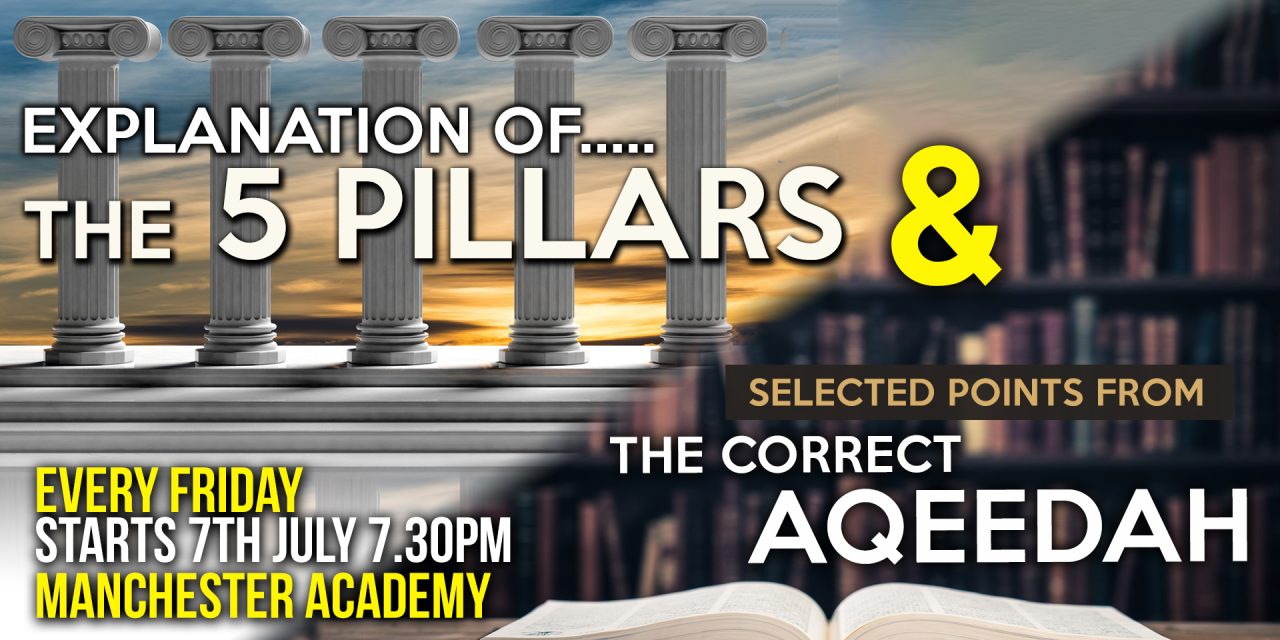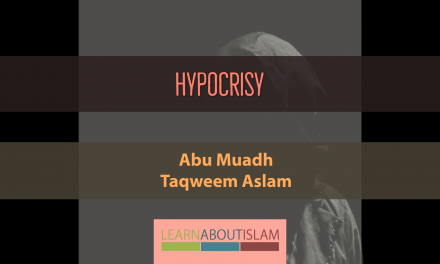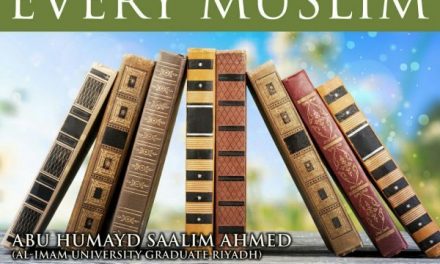The 6 Pillars of Eemaan
The third lesson from the “Important Lessons for the Muslim Ummah” of Shaykh Bin Baaz is the Pillars of Eemaan.
Non-Shake Ways to Use Protein Powder – IronMag Bodybuilding & Fitness Blog npp steroid benefits home – female bodybuilding 1980s, female bodybuilding uk – the black kama sutra playhouse
The 6 pillars are to believe in:
1) Allaah
2) His Angels
3) His Books
4) His Messengers
5) The Last Day
6) Qadr (Divine Predecree) – its good and its bad
A person’s Eemaan cannot exist without firstly believing in these 6 pillars.
These are the principles that all of the Prophets were united upon. They all agreed in calling to these 6 pillars. Their call focused on these foundations.
The Prophet Sallallaahu Alayhi Wa Sallam said:
“The Prophets are brothers from one Father. Their mothers are different but their religion is one.”
Meaning; Their ‘Aqeedah is one but their legislations may differ.
The affairs of belief do not have any abrogation, i.e. the usool (foundations) of the Prophets were all the same and have never been abrogated. The only matters that abrogation entered into were the legislations and the rulings.
Allaah says:
“And for every one of you (of the Prophets) we made for him a legislation and a way to follow (i.e. a sunnah)”
You cannot separate the pillars from each other, you must believe in all of them. They go hand in hand. The one who believes in some and not in others cannot be called a believer.
In the Qur’an we find many ayaat affirming these six pillars, for example:
Allaah says in Surah Al Baqarah:
ذَٰلِكَ الْكِتَابُ لَا رَيْبَ ۛ فِيهِ ۛ هُدًى لِلْمُتَّقِينَ
“This is the Book (the Quran), whereof there is no doubt, a guidance to those who are Al-Muttaqun [the pious and righteous persons who fear Allah much (abstain from all kinds of sins and evil deeds which He has forbidden) and love Allah much (perform all kinds of good deeds which He has ordained)].”
الَّذِينَ يُؤْمِنُونَ بِالْغَيْبِ وَيُقِيمُونَ الصَّلَاةَ وَمِمَّا رَزَقْنَاهُمْ يُنْفِقُونَ
“Who believe in the Ghaib and perform As-Salat (Iqamat-as-Salat), and spend out of what we have provided for them [i.e. give Zakat, spend on themselves, their parents, their children, their wives, etc., and also give charity to the poor and also in Allah’s Cause – Jihad, etc.].”
وَالَّذِينَ يُؤْمِنُونَ بِمَا أُنْزِلَ إِلَيْكَ وَمَا أُنْزِلَ مِنْ قَبْلِكَ وَبِالْآخِرَةِ هُمْ يُوقِنُونَ
“And who believe in (the Quran and the Sunnah) which has been sent down (revealed) to you (Muhammad Peace be upon him) and in [the Taurat (Torah) and the Injeel (Gospel), etc.] which were sent down before you and they believe with certainty in the Hereafter. (Resurrection, recompense of their good and bad deeds, Paradise and Hell, etc.).”
All of these pillars are related to the “Ghaib” (the unseen). To believe in the unseen is to oppose the norm as it relates to having belief in something. Typically, belief returns back to the 5 senses:
Sight, Hearing, Smell, Touch, Taste.
Normally, one will not believe in something unless at least one of these senses is present. However, the belief in the 6 pillars requires belief without these 5 senses. This is why having Eemaan in them is something tremendous.
Allaah says, once again in Surah Al Baqarah, as it relates to the reality of Eemaan:
“It is not Al-Birr (piety, righteousness) that you turn your faces towards east and (or) west (in prayers); but Al-Birr is (the quality of) the one who believes in Allah, the Last Day, the Angels, the Book, the Prophet’s”
and also in Surah Al Baqarah:
“The Messenger believes in what has been sent down to him from his Lord, and (so do) the believers. Each one believes in Allah, His Angels, His Books, and His Messengers. They say, “We make no distinction between one another of His Messengers” – and they say, “We hear, and we obey. (We seek) Your Forgiveness, our Lord, and to You is the return (of all).””
Regarding the above verse (The second to last verse of Surah Al Baqarah) and the verse that follows it, the Prophet Sallallaahu Alayhi Wa Sallam said:
“Whoever recites the final two verses of Surah Al-Baqarah at night, they will suffice him “
(Bukhari and Muslim)
This is because in these 2 ayaat is a reminder of the pillars of Eemaan and as a result it is a renewal of ones Eemaan as the Prophet Sallallaahu Alayhi Wa Sallam informed us:
“Iman will wear out and deteriorate in your heart just like the garment wears out and deteriorates, so ask Allaah that He renews Eemaan in your heart”
(Recorded in Al Hakim and Tabarani)
Belief in Allaah
The first, and most important of the 6 pillars, is Belief in Allaah. All other pillars stem back to this pillar. It’s not possible to have belief in the others without the belief in Allaah. However, it’s possible to have Belief in Allaah but not in the others. The mushrikin at the time of the Prophet Sallallaahu Alayhi Wa Sallam had Belief in Allaah, however, that belief was deficient. They did not believe in resurrection after death.
For this reason, the mention of Belief in Allaah comes first, except in a few places, for example:
“You are the best of peoples ever raised up for mankind; you enjoin Al-Ma’ruf (i.e. Islamic Monotheism and all that Islam has ordained) and forbid Al-Munkar (polytheism, disbelief and all that Islam has forbidden), and you believe in Allah.”
The reason it wasnt mentioned first in this case was because enjoining Al Ma’ruf and forbidding Al Munkar was the distinguishing factor between this nation and the others, as the Christians and the Jews believed in Allaah aswell.
Belief in Allaah consists of 3 pillars:
1) To believe in the Oneness of Allaah in His Lordship (Ruboobiyyah) – to single out Allaah in His Actions (Creating, Sustaining, Maintaining the Affairs, etc)
2) To believe in the Oneness of Allaah in His Names and Attributes – So the creation become aware of who they are worshipping. These Names and Attributes are found only from the Quraan and Sunnah, there is no room for us to derive names for ourselves. We affirm them just as they came and we pass them on just as they came.
“And (all) the Most Beautiful Names belong to Allah, so call on Him by them” 7:180
“Say: “Invoke Allah or invoke the Most Beneficent (Allah), by whatever name you invoke Him (it is the same), for to Him belong the Best Names” 17:110
As it relates to the Names and Attributes of Allaah, we have 4 key principles; We do not 1) Ask “How?” (Takyeef); 2) Liken them to creation (Tamtheel); 3) Distort the meaning (Tahreef); 4) Render them futile (Ta’teel)
Imam Ahmed said:
“We describe Allaah with that which He described Himself with, and with that which His Messenger Sallallaahu Alayhi Wa Sallam described Him with”
(Majmoo’ fataawa 5/26)
3) To believe in the Oneness of Allaah with His Worship (Uloohiyyah) – to single out Allaah with our actions
“And they were commanded not, but that they should worship Allah, and worship none but Him Alone (abstaining from ascribing partners to Him), and perform As-Salat (Iqamat-as-Salat) and give Zakat, and that is the right religion.” (98:5)
This 3rd and final pillar (Uloohiyyah) was the reason the Prophets fought with the Mushrikoon. As this was the point of differing between the believers and the disbelievers.
In next week’s lesson we will move on to the Belief in the Angels bi’ithnillaahi ta’aalah. For the full benefit of this lesson, listen to the audio. BaarakAllaahu Feekum.







